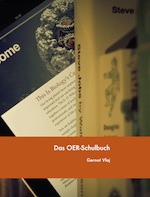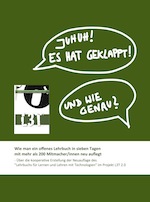 Band 8 der Buchserie „Beiträge zu offenen Bildungsressourcen (O3R)“ ist nun online bzw. als Printversion erhältlich. Gernot Vlaj stellt dafür seine Diplomarbeit zur Verfügung mit dem Titel „Das OER-Schulbuch: Machbarkeitsstudie zum Einsatz / zur Umsetzung von Schulbüchern als freite Bildungsressource„. Er hat sich intensiv damit auseinandergesetzt ob das Schulbuch unter einer offenen Lizenz generell möglich ist und welche Auswirkungen es auf das gesamte System hätte.
Band 8 der Buchserie „Beiträge zu offenen Bildungsressourcen (O3R)“ ist nun online bzw. als Printversion erhältlich. Gernot Vlaj stellt dafür seine Diplomarbeit zur Verfügung mit dem Titel „Das OER-Schulbuch: Machbarkeitsstudie zum Einsatz / zur Umsetzung von Schulbüchern als freite Bildungsressource„. Er hat sich intensiv damit auseinandergesetzt ob das Schulbuch unter einer offenen Lizenz generell möglich ist und welche Auswirkungen es auf das gesamte System hätte.
Digitalen Lehr- und Lernunterlagen gehört die Zukunft. Der Weg dorthin ist allerdings voller Herausforderungen, die es zu bewältigen gilt. Ein erster Schritt wäre das Schulbuch, ein Medium welches sehr weit verbreitet ist, aus dem analogen Zeitalter in das digitale zu bringen. Die vorliegende Forschungsarbeit wird zeigen, dass dieses Vorhaben in erster Linie aus rechtlicher Sicht aktuell nicht so einfach umsetzbar ist. Sowohl in Österreich als auch in Deutschland sind bei den derzeitigen urheberrechtlichen Bedingungen, die Vorteile eines digitalen Schulbuchs nur eingeschränkt nutzbar. Eine Lösung wird hier mit Open Educational Resources (OER = freie und offene Bildungsressourcen) angedacht.

